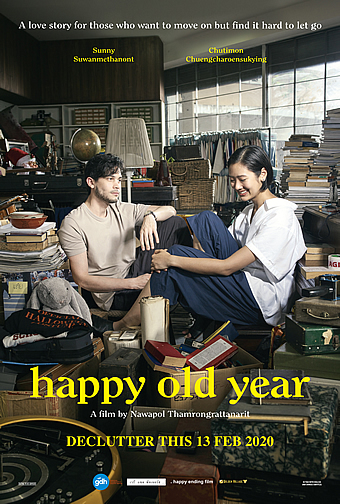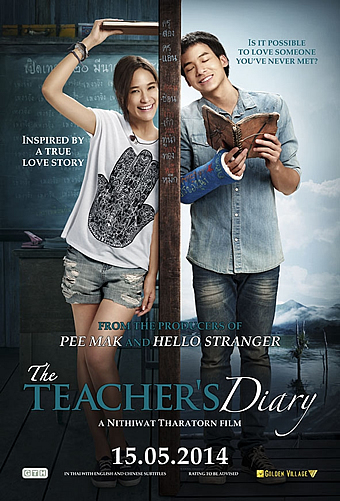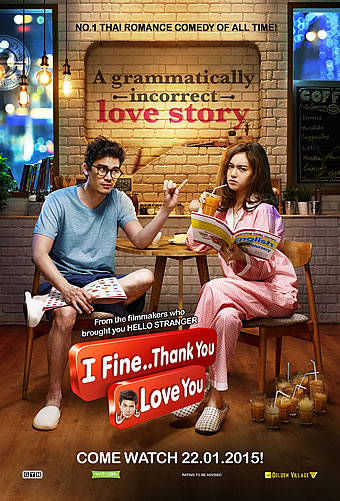HAPPY OLD YEAR (2019)
Genre: Drama/Romance
Director: Nawapol Thamrongrattanarit
Cast: Chutimon Chuengcharoensukying, Sunny Suwanmethanont
Runtime: 1 hr 53 mins
Rating: PG13 (Some Coarse Language)
Released By: Golden Village Pictures
Official Website:
Opening Day: 13 February 2020
Synopsis: A love story for those who want to move on but find it hard letting go. Jean wants to convert her house into a home office and needs to majorly declutter and reorganise the entire house. Anything that has been lying around unused, she just simply throws away. However, Jean faces a great challenge when she comes across some items that belonged to Aim, her ex-boyfriend. Although she has no use for the items, each one reminds her of a story that brings back memories, along with unresolved feelings that cannot be easily discarded by just throwing them into the garbage bag. Jean has to decide what to do with Aim’s stuff. Should she just throw everything, keep everything, or return the items to their rightful owner to clear them completely from her house and her heart?
Movie Review:
A radical home makeover modelled after Marie Kondo’s minimalist style prompts a series of dilemmas about what to do with the stuff from the past in writer-director Nawapol Thamrongrattanarit’s well-intentioned but ultimately muddled drama ‘Happy Old Year’.
The twenty-something year old Jean (Chutimon Chuengcharoensukying, whom you’ll recognise from ‘Bad Genius’) is behind the decluttering effort, after moving back to Bangkok following her studies in Sweden and eager to convert her house into a home office.
Her mother (Apasiri Nitibhon) is stubbornly resistant to simply clearing the house out, and is particularly adamant about keeping the piano which her father had used to play before he walked out of them. Should Jean indulge her mother by keeping the piano, or force her mother to let go of anything and everything associated with her father?
That dilemma unfolds alongside her own closure with her ex-boyfriend Aim (Sunny Suwanmethanont), which she had put off for the last three years after walking out abruptly on him. After discovering among her things an old camera which belonged to Aim, Jean proceeds to return it to him, even going to the extent of showing up at his place after a failed postal delivery.
Needless to say, Jean’s reappearance in Aim’s life disrupts his relationship with his current girlfriend (Sarika Sathsilpsupa) – not only does the latter have to bear with Aim picking up the pieces with Jean after a three-year moratorium, she comes to realise how much of Jean is still left in Aim’s life, e.g. a T-shirt she wears casually in Aim’s house actually belongs to Jean.
Those expecting a glossy romance will no doubt be disappointed by Thamrongrattanarit’s treatment of what happens between Jean and Aim. Suffice to say that there is no happy ending in store for both of them; in fact, neither they or Aim’s girlfriend is better off with Jean’s return. But more than the outcome itself, Thamrongrattanarit has written this as essentially a character study of Jean.
Did she return the camera for Aim’s sake or hers, especially since it wasn’t Aim who had been bugging her to return it in the first place? What did she intend to achieve by doing so? Was it in fact fair for her to do so, especially given how it would likely upend Aim’s existing life? As simple as the act of returning the camera might seem, it is the ensuing repercussions which Jean is forced to contend with.
And in the same way, Jean is forced to re-examine if she was being fair to her mother by robbing the latter of the memories she is just as entitled to preserve should she choose to. Where is the line between protecting a person from his or her past and being selfish to that same person? It isn’t an easy question to answer, and unfortunately Thamrongrattanarit seems equally torn.
As difficult as the questions he raises in the film are, Thamrongrattanarit is a lot better at highlighting the moral quandaries than he is at coming to a compelling conclusion on them. In both Aim and Jean’s mother’s stories, Thamrongrattanarit leaves his audience hanging whether Jean’s actions were borne out of her own selfish desire to move on or to help those around her find closure.
Worse, the storytelling moves at such a glacial pace it is almost vexing, and certainly left unsatisfied when it comes to an ambiguous close. Chuengcharoensukying is always pleasing to watch, and admirably handles the emotionally delicate scenes in the movie with adroitness, but her presence alone is not enough to perk up the deliberately paced proceedings.
We’d loved to embrace ‘Happy Old Year’, but we ended up befuddled at what the movie was truly getting at. Is its message one of caution for us to think about the possible consequences of what it would take for one to move on from the past, because they have present-day implications? Or is it about helping those who refuse to move on, because it is ultimately better for them? It isn’t clear what ‘Happy Old Year’ wants to say, and while intriguing to watch, leaves us wanting more.
Movie Rating:



(To cling onto the past or to let it go, and whether we should make that choice for ourselves or on behalf of others too - 'Happy Old Year' has intriguing themes but a less than compelling conclusion)
Review by Gabriel Chong
You might also like:





